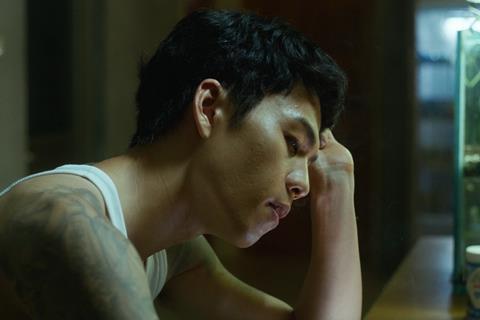Taiwanese actor Lee Hong-chi makes his directorial debut with this tale of an ex-convict desperately trying to go straight

Dir. Lee Hong-chi. Hong Kong, Taiwan. 2023. 81mins
The gut punch title of Lee Hong-chi’s directorial debut may suggest a belated entry in the lamentable cycle of Quentin Tarantino imitations, but Love Is A Gun is actually an existential noir wherein acts of violence are comparatively fleeting. Best summarised as a crime-tinged study of generational malaise, it shows that co-writer/director/star Lee has gleaned ample know-how from appearing in such art-house fare as Tso-chi Chang’s Thanatos, Drunk (2015), Ho Wi-ding’s Cities Of Last Things (2018), Bi Gan’s Long Day’s Journey Into Night (2018) and Li Xiaofeng’s Back To The Wharf (2020). Like those filmmakers, Lee focuses on an anti-hero protagonist while prioritising the exploration of milieu over plot points. This means that Love is a Gun comes fully loaded with philosophical ruminations and socio-economic anxieties, although some of its character dynamics feel a tad underdeveloped.
A crime-tinged study of generational malaise
Premiering in Venice Critics Week, Love Is A Gun should do the trick as a calling card for Lee’s career behind the camera with engagements at Asian-themed events to follow. If it doesn’t lean heavily enough into its genre elements to be readily marketed as a crime flick, there is still moderate streaming potential here so specialist distributors or platforms with East Asian indie catalogues may take notice.
In a nondescript seaside town, Sweet Potato (played by Lee himself) scrapes a living by renting umbrellas to tourists and resides in a family property which is declining in value due to the lack of public transport to the area. This humble lifestyle is a means of moving beyond a chequered past: Sweet Potato was a low-level underworld enforcer until his involvement in a shooting landed him behind bars for three years. His efforts to stay on the straight and narrow are going well – at least until his mother calls asking for help with clearing her gambling debts.
Filial piety briefly takes Sweet Potato to Taipei where he tries to secure a steady job, but to no avail. Instead, he becomes reacquainted with hot-headed former associate Maozi (Lin Ke Ren), who presents him with a debt-collecting opportunity. Back at the seaside, Sweet Potato tries to decide what do with his life while oscillating between two women: his on/off girlfriend Lulu (Zheng Qing Yu) and childhood friend Seven (Lin Ying Wei).
Even if he’s too fresh faced to thoroughly convince as a former criminal who has served time, Lee exudes the necessary sense of conflict and indecision in the lead role. Aside from Edison Song’s inconsequential cameo as a friend who has thrived in legitimate enterprise, the supporting cast is filled with relative newcomers. Of these, the especially poised Lin Ying Wei makes the strongest impression as a love interest who has cultivated an air of mystery in the years since she instigated childhood escapades. The rest are fairly competent but lack sufficient experience to give life to barely sketched characters (Maozi is a thuggish caricature, while Lulu only turns up to berate Sweet Potato about his life choices).
Variable performances aside, the youthful cast enables Lee to present a compact millennial cross-section that is negotiating the rules, restrictions and expectations of Taiwanese society.
As a former hoodlum, Sweet Potato is constantly reminded that he is stuck on the lower rung. The unseen but often mentioned “Big Boss” of the underworld serves as a metaphor for overarching power structures, while the post-pandemic use of face masks and Sweet Potato’s need for a ‘Good Citizen Certificate’ to secure a job in Taipei are tacit reminders of state control. At a more localised level, there is a village chief (Lee Yu Yao) who trades in friendliness, but has no qualms about resorting to threats as a means of securing votes for the upcoming election.
Then there are financial commitments (Sweet Potato’s social circle gripes about 30-year mortgages) and the monetary inconveniences caused by familial ties. The protagonist is not always sympathetic – his tendency to blame his mother’s gambling addiction for his mistakes is a way of spurning accountability – but his yearning for a minimalistic existence is entirely relatable.
This pressurised climate is visually conveyed by cinematographer Zhu Ying Rong’s measured camera movement and expert use of boxy Academy ratio, particularly when the natural landscape is enveloped by oppressive smog. Yet it is not an overwhelming gloomy palette. A deceptively calm surface is evoked through tropical blues and greens, while scenes involving fireworks or the burning of heirlooms provide striking motifs.
There are also quirkily amusing touches with Lee’s deadpan approach to gangsters echoing that of Takeshi Kitano circa Boiling Point (1990) and Sonatine (1993), with goons in black suits kicking a football around against the placid seaside backdrop. Bruce Su’s blissfully euphoric electronic score is curiously at odds with the atmosphere of suppressed exasperation, but it’s one of just a few off-notes in a succinctly realised and eminently promising first feature.
Production companies: Monologue Films, Southie Films
International sales: Parallax Films, caoliuying@parallaxchina.com
Producers: Shan Zuolon, Liao Che-i
Screenplay: Lee Hong-Chi, Lin Cheng Hsun
Editing: Qin Yanan
Cinematography: Zhu Ying Rong
Music: Bruce Su
Main cast: Lee Hong-chi, Lin Ying Wei, Zheng Qing Yu, Lin Ke Ren, Lee Yu Yao, Edison Song
























